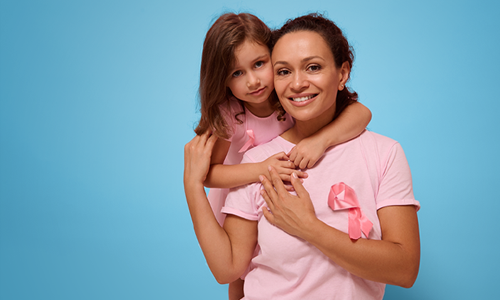سرطان الثدي، هو مصدر قلق صحي كبير يؤثر على ملايين النساء في جميع أنحاء العالم. في حين أن عوامل الخطر متعددة الأوجه، هناك أدلة تشير إلى أن جوانب رحلة المرأة الإنجابية، مثل الحمل والرضاعة الطبيعية، يمكن أن تلعب دورًا حاسمًا في تقليل خطر الإصابة بسرطان الثدي. في هذه المدونة، سنستكشف العلاقة الرائعة بين الحمل والرضاعة الطبيعية والوقاية من سرطان الثدي، ونقدم رؤى وتفاؤلاً وتشجيعًا لصحة المرأة ورفاهيتها.
فهم الأساسيات
قبل أن نستكشف العلاقة بين الحمل والرضاعة الطبيعية والوقاية من سرطان الثدي، دعونا أولاً ندرك بعض المفاهيم الأساسية.
- عوامل خطر ىالإصابة بسرطان الثدي: يمكن أن تؤثر عوامل مختلفة على خطر الإصابة بسرطان الثدي، بما في ذلك الجينات والعمر ونمط الحياة والتاريخ الإنجابي.
- الرحلة الإنجابية: تشمل رحلة المرأة الإنجابية الحمل والرضاعة الطبيعية والولادة.
- التأثير الهرموني: يمكن للهرمونات، وخاصة هرموني الاستروجين والبروجسترون، أن يكون لها تأثير كبير على خطر الإصابة بسرطان الثدي. فقد يؤدي التعرض لهرمون الاستروجين على مدار حياة المرأة إلى زيادة خطر الإصابة بسرطان الثدي.
العلاقة بين الحمل والوقاية من سرطان الثدي
- يقلل الحمل من التعرض لهرمون الاستروجيين: خلال فترة الحمل، يعاني جسم المرأة من زيادة في الهرمونات، مما قد يؤدي إلى تغييرات في أنسجة الثدي، حيث من الممكن أن يؤدي هذا التحول الهرموني بشكل مؤقت إلى تقليل التعرض التراكمي لنسيج الثدي لهرمون الإستروجين، وبالتالي قد يقلل من خطر الإصابة بسرطان الثدي.
- الحمل المكتمل يوفر الحماية: تشير الدراسات إلى أن الحمل الكامل (الذي يستمر عادةً حوالي 40 أسبوعًا) قد يوفر حماية أكبر ضد الإصابة بسرطان الثدي من حالات الحمل التي تنتهي قبل الأوان. فكلما زاد عدد حالات الحمل الكامل لدى المرأة، زادت الفوائد الوقائية المحتملة.
في دراسة نُشرت في مجلة “Cancer Epidemiology; Biomarkers & Prevention”، تم اكتشاف أن النساء اللواتي كان لديهن أول حمل كامل قبل سن العشرين يتمتعن بانخفاض خطر الإصابة بسرطان الثدي بنسبة 50% مقارنة بالنساء اللواتي لم يحملن مطلقًا.
ومع ذلك، كلما زاد العمر عند أول حمل كامل، انخفض التأثير الوقائي. على وجه التحديد، النساء اللواتي تعرضن لأول حمل كامل بين سن 30 و 34 عامًا شهدن انخفاضًا أكثر تواضعًا بنسبة 10% في خطر الإصابة بسرطان الثدي مقارنة بالنساء اللواتي لم يحملن مطلقًا.
دور الرضاعة الطبيعية
تعد الرضاعة الطبيعية جانبًا مهمًا آخر من رحلة المرأة الإنجابية، والتي قد تساهم في الوقاية من سرطان الثدي. إليك الطريقة:
- تقليل التعرض لهرمون الاستروجين: تقلل الرضاعة الطبيعية مؤقتًا من تعرض المرأة لهرمون الاستروجين لأنها تمنع الإباضة والحيض. يمكن أن يساعد هذا الانخفاض في هرمون الاستروجين في الحماية من سرطان الثدي.
- تطور الخلايا المتمايزة: تشجع الرضاعة الطبيعية على تطور خلايا الثدي المتمايزة، والتي تكون أقل عرضة للإصابة بالسرطان.
- فترة زمنية أقصر للطفرات المحتملة: عندما ترضع المرأة طفلها رضاعة طبيعية، فإنها تقلل من الوقت بين الدورات الشهرية، وبذلك قد يحد هذا النطاق الأقصر من فرصة حدوث طفرات محتملة في الخلايا الثديية، مما يقلل بشكل أكبر من خطر الإصابة بسرطان الثدي.
تعزيز العافية والصحة
في حين أن العلاقة بين الحمل والرضاعة الطبيعية والوقاية من سرطان الثدي مهم، ولكن يجب علينا أن نتذكر أن رحلة كل امرأة خاصة بها وتختلف عن النساء الأخريات. إليك بعض النقاط المهمة لتعزيز العافية والصحة:
- الفحوصات الطبية المنتظمة: الاكتشاف المبكر أمر بالغ الأهمية. يمكن أن تساعد الفحوصات الذاتية للثدي والتصوير الشعاعي للثدي بانتظام على اكتشاف سرطان الثدي في مراحله المبكرة عندما يكون أكثر قابلية للعلاج.
- اتباع نمط الحياة الصحي: النظام الغذائي المتوازن والنشاط البدني المنتظم والحفاظ على وزن صحي هي مكونات أساسية للصحة العامة والحد من مخاطر الإصابة بالسرطان.
- استشارة مقدم الرعاية الصحية: إذا كنت تفكرين في الحمل أو الرضاعة الطبيعية أو لديك مخاوف بشأن مخاطر الإصابة بسرطان الثدي، فاستشيري مقدم الرعاية الصحية الخاص بك. يمكنهم تقديم إرشادات مصممة خصيصًا لحالتك.
في حين أن الحمل والرضاعة الطبيعية هما أمران مهمان في الصورة المعقدة للوقاية من سرطان الثدي، من المهم أن تتذكر أنهما مجرد جزء من اللغز. تساهم مجموعة من العوامل، بما في ذلك الجينات واختيارات نمط الحياة والفحوصات المنتظمة، في صحة الثدي بشكل عام. من خلال البقاء على اطلاع والانخراط في سلوكيات صحية وطلب التوجيه من المتخصصين في الرعاية الصحية، يمكن للنساء اتخاذ خطوات استباقية لتقليل مخاطر الإصابة بسرطان الثدي والحفاظ على صحتهن.


